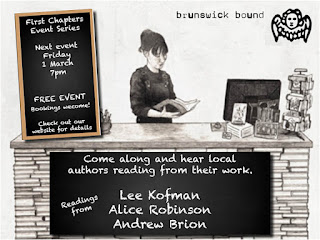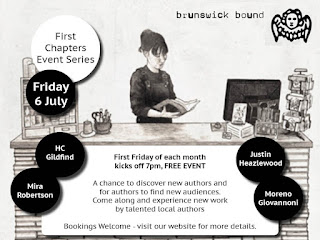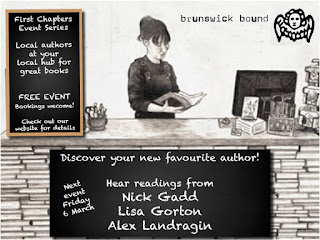First Chapters Q&A with Alice Robinson
Alice Robinson has had fiction, essays and review published widely in literary journals including Kill Your Darlings, The Lifted Brow, Overland, TEXT, Firefles, Arena and Meanjin. Her debut novel Anchor Point was longlisted for The Stella Prize and the Indie Book Awards in 2016.
She has a Bachelor of Creative Arts from The University of Melbourne and a PhD in Creative Writing from Victoria University, where she was award the Vice Chancellor's Award for Research and Research Training.
Alice lives in Warragul with her family.
She will be reading at First Chapters on Friday 1 March from her novel The Glad Shout.
1. Brunswick
Bound has asked you to read a piece from your published work. Tell us
what we can expect from the piece you have chosen?
The
protagonist of The Glad Shout,
Isobel, and her three year-old daughter, Matilda, have been evacuated to a big
sports stadium in Melbourne
2. How
would you describe the kind of books that you write?
I
have published two novels, and although their narratives differ, they are both
literary fiction; both set in Australia
- primarily in Victoria
3. What
was the first book that you read (or had read to you) that left an impression
on you?
So
many! My parents (divorced from each other) were both teachers and prolific
readers themselves and each read to me, an only child, religiously. I remember
my mother reading the classics – The RailwayChildren; The Secret Garden; Little Women; Seven Little Australians; Heidi; Anneof Green Gables and so on. I remember my father reading The Hobbit and C.S Lewis’ Books aboutNarnia, and he also read poetry aloud to me at bedtime. I was very lucky. Beyond
these, the first book that made a big impression on me was John Marsden’s Tomorrow When the War Began, which became
(and remains) one of my all-time favourite books for two reasons: it features a
female protagonist being brave, clever and resilient, and it is set in Australia
– a landscape I knew intimately and recognised, which was thrilling to me as a
child.
4. Do
you believe that books should answer life’s big questions?
Not
really – not if we’re talking about novels. With the best novels, I reckon, the
stories are very specific (about these
people) and also universal of course (about these
big questions). But I think the specificity in the first instance takes away
the potential for question answering…although
not for question asking or showcasing. So perhaps we could see
fiction ask asking life’s big questions,
and showing how they might be tackled
(if not answered) for these people over here...Then it’s up to the writer
and each of the readers to consider their own moral compasses, their own lives
and circumstances and reflect on the big questions from their own perspectives.
Asking questions is perhaps more expansive and creative and valuable than getting
answers. That fiction can lead people into new intellectual and emotional territory
is so powerful!
5. Do
you have any writing quirks?
I’m
not sure. I don’t really understand grammatical rules, if that counts.
6. What
is your favourite word or phrase?
Too
hard!
7. What
have you found most surprising about publishing a book?
I’m
surprised by everything.
When
you’re an aspiring writer everyone says, ‘It’s really impossible to get published…it’s
really competitive…don’t get your hopes up…get a day job etc’… and then when
you send your manuscript in, people say, ‘The slush pile is where books go to
die…’ or, ‘Some intern will probably be in charge of deciding whether it gets
read…’ Then, when it gets picked up people say, ‘It’s impossible to get reviewed…the
market in Australia
8. What
is the question that you hope never to be asked in an author Q&A?
‘How
much research did you do on…[some technical/niche aspect of the narrative]…’
9. What
question do you hope you will be asked and why?
I
often get asked about climate change, which is fair because it is a dominant thematic
concern of my work, and it is topical. But I am not a scientist…I’m not even an
activist…and my outlook is gloomy, which is not always palatable for public
discourse.
I
really wish that I would get asked more
about writing – which is something I do feel qualified to discuss and am
passionate about.
I
would like to get asked about what novels are
and what they are doing. How you
might make one and what makes them good. I wish I could be asked about
writing practices and processes – the logistics of how work gets done. I would like to get
asked about teaching writing and also
learning to be a writer…both of which
– along with the rest of these topics - seem somehow mysterious to aspiring and
experienced writers alike, and therefore seem to me to be worth talking about.
I
especially wish that people would ask
me about how all of this intersects with motherhood. I know that some women/writers/feminists
don’t like to be asked this question because they feel it is a hallmark of gender
inequity, but I think the strain of maintaining a creative life and raising
children is real and important – and it is valuable for women (myself included)
when these matters are addressed with nuance and honesty in public discourse.
10. Which
author that you have read do you think should be better known or more widely
read?
The
Canadian poet and novelist Anne Michaels should be read by every reader and writer
in the land. Her use of language is so exquisite. I felt really changed by
encountering what she can do with metaphor on the line and as a structural
device at the narrative level.
You can find out more about First Chapters on the Brunswick Bound website.





Comments
Post a Comment